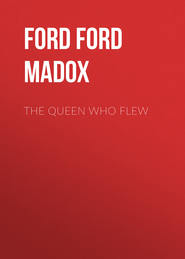По всем вопросам обращайтесь на: info@litportal.ru
(©) 2003-2024.
✖
The Fifth Queen Crowned
Настройки чтения
Размер шрифта
Высота строк
Поля
III
When Henry was calmed by his pacing in her chamber he came out to her in the sunlight, rolling and bear-like, and so huge that the terrace seemed to grow smaller.
'Chuck,' he said to her, 'I ha' done a thing to pleasure thee.' He moved two fingers upwards to save the Duke of Norfolk from falling to his knees, caught Katharine by the elbow, and, turning upon himself as on a huge pivot, swung her round him so that they faced the pavilion. 'Sha't not talk with a citron-faced uncle,' he said; 'sha't save sweet words for me. I will tell thee what I ha' done to pleasure thee.'
'Save it a while and do another ere ye tell me,' she said.
'Now, what is your reasoning about that, wise one?' he asked.
She laughed at him, for she took pleasure in his society and, except when she was earnest to beg things of him, she was mostly gay at his side.
'It takes a woman to teach kings,' she said.
He answered that it took a Queen to teach him.
'Why,' she said, 'listen! I know that each day ye do things to pleasure me, things prodigal or such little things as giving me pouncet boxes. But you will find – and a woman, quean or queen, knows it well – that to take the full pleasure of her lover's surprises well, she must have an easy mind. And to have an easy mind she must have granted her the little, little boons she asketh.'
He reflected ponderously upon this point and at last, with a sort of peasant's gravity, nodded his head.
'For,' she said, 'if a woman is to take pleasure she must guess at what you men have done for her. And if she be to guess pleasurably, she must have a clear mind. And if I am to have a clear mind I must have a maiden consoled with a husband.'
Henry seated himself carefully in the great chair of the small pavilion. He spread out his knees, blinked at the view and when, having cast a look round to see that Norfolk was gone – for it did not suit her that he should see on what terms she was with the King – she seated herself on a little foot-pillow at his feet, he set a great hand upon her head. She leaned her arms across over his knees, and looked up at him appealingly.
'I do take it,' he said, 'that I must make some man rich to wed some poor maid.'
'Oh, Solomon!' she said.
'And I do take it,' he continued with gravity, 'that this maid is thy maid Margot.'
'How know you that?' she said.
'I have observed her,' he maintained gravely.
'Why, you could not well miss her,' she answered. 'She is as big as a plough-ox.'
'I have observed,' he said – and he blinked his little eyes as if, pleasurably, she were, with her words, whispering around his head. 'I have observed that ye affected her.'
'Why, she likes me well. She is a good wench – and to-day she tore my hair.'
'Then that is along of a man?' he asked. 'Didst not stick thy needle in her arm? Or wilto be quit of her?'
She rubbed her chin.
'Why, if she wed, I mun be quit of her,' she said, as if she had never thought of that thing.
He answered —
'Assuredly; for ye may not part man and lawful wife were you seven times Queen.'
'Why,' she said, 'I have little pleasure in Margot as she is.'
'Then let her go,' he answered.
'But I am a very lonely Queen,' she said, 'for you are much absent.'
He reflected pleasurably.
'Thee wouldst have about thee a little company of well-wishers?'
'So that they be those thou lovest well,' she said.
'Why, thy maid contents me,' he answered. He reflected slowly. 'We must give her man a post about thee,' he uttered triumphantly.
'Why, trust thee to pleasure me,' she said. 'You will find out a way always.'
He scrubbed her nose gently with his heavy finger.
'Who is the man?' he said. 'What ruffler?'
'I think it is the Magister Udal,' she answered.
Henry said —
'Oh ho! oh ho!' And after a moment he slapped his thigh and laughed like a child. She laughed with him, silverly upon a little sound between 'ah' and 'e.' He stopped his laugh to listen to hers, and then he said gravely —
'I think your laugh is the prettiest sound I ever heard. I would give thy maid Margot a score of husbands to make thee laugh.'
'One is enough to make her weep,' she said; 'and I may laugh at thee.'
He said —
'Let us finish this business within the hour. Sit you upon your chair that I may call one to send this ruffler here.'
She rose, with one sinuous motion that pleased him well, half to her feet and, feeling behind her with one hand for the chair, aided herself with the other upon his shoulder because she knew that it gave him joy to be her prop.
'Call the maid, too,' she said, 'for I would come to the secret soon.'
That pleased him too, and, having shouted for a knave he once more shook with laughter.
'Oh ho,' he said, 'you will net this old fox, will you?'
And, having sent his messenger off to summon the Magister from the Lady Mary's room, and the maid from the Queen's, he continued for a while to soliloquise as to Udal's predicament. For he had heard the Magister rail against matrimony in Latin hexameters and doggerel Greek. He knew that the Magister was an incorrigible fumbler after petticoats. And now, he said, this old fox was to be bagged and tied up.
He said —
'Well, well, well; well, well!'
For, if a Queen commanded a marriage, a marriage there must be; there was no more hope for the Magister than for any slave of Cato's. He was cabined, ginned, trapped, shut in from the herd of bachelors. It pleased the King very well.












